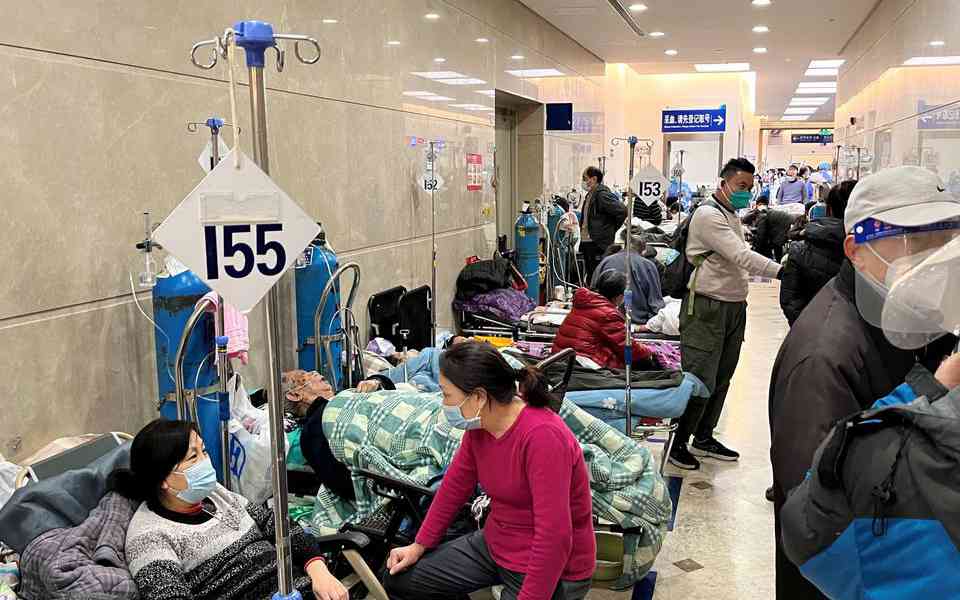
State media in China played down the severity of a surge of COVID-19 infections ahead of an expected briefing on Tuesday by its scientists to the World Health Organization, which is hoping for a "detailed discussion" on the evolution of the virus.
China's abrupt U-turn on COVID controls on Dec. 7, as well as the accuracy of its case and mortality data, have come under increasing scrutiny at home and abroad.
China's foreign ministry labelled travel entry curbs imposed by some countries as "simply unreasonable", saying they "lacked scientific basis".
"We are willing to improve communication with the world," foreign ministry spokeswoman Mao Ning told reporters in Beijing.
"But ... we are firmly opposed to attempts to manipulate the epidemic prevention and control measures for political purposes, and will take corresponding measures in different situations according to the principle of reciprocity."
China's shift away from a "zero-COVID" policy that had been championed by President Xi Jinping followed protests that had marked the strongest show of public defiance during his decade in power and had coincided with the economy's slowest growth in nearly half a century.
As the virus spreads unchecked, funeral parlours have reported a spike in demand for their services and international health experts predict at least one million deaths in China this year.
China reported three new COVID deaths for Monday, taking its official death toll since the pandemic began to 5,253.
- Young entrepreneur dreams big
- Chibuku NeShamwari holds onto ethos of culture
- Health talk: Be wary of measles, its a deadly disease
- Macheso, Dhewa inspired me: Chinembiri
Keep Reading
On Tuesday, the People's Daily, the Communist Party's official newspaper, cited Chinese experts as saying the illness caused by the virus was relatively mild for most people.
"Severe and critical illnesses account for 3% to 4% of infected patients currently admitted to designated hospitals in Beijing," Tong Zhaohui, vice president of the Beijing Chaoyang Hospital, told the newspaper.
Kang Yan, head of West China Tianfu Hospital of Sichuan University, said that in the past three weeks, a total of 46 patients had been admitted to intensive care units, or about 1% of symptomatic infections.
The emergencies area at the Zhongshan Hospital in Shanghai was packed with patients on Tuesday, a Reuters witness said.
Some were in beds in the corridor receiving IV treatment while dozens were queuing around them, waiting to see a doctor. It was unclear how many were there with COVID.
WHO MEETINGThe World Health Organization has urged Chinese health officials to regularly share specific and real-time information on the outbreak.
The WHO has invited Chinese scientists to present detailed data on viral sequencing at a technical advisory group meeting on Tuesday. It has also asked China to share data on hospitalizations, deaths and vaccinations.
Ahead of the meeting scheduled for Tuesday afternoon Geneva time, a WHO spokesperson said that a "detailed discussion" was expected about circulating variants in China, and globally, with Chinese scientists expected to make a presentation.
But some experts doubted that China would be very forthright.
"I don't think China will be very sincere in disclosing information," said Alfred Wu, associate professor at the Lee Kuan Yew School of Public Policy at National University of Singapore.
"They would rather just keep it to themselves or they would say nothing happened, nothing is new. My own sense is that we could assume that there is nothing new ... but the problem is China’s transparency issue is always there."
The United States, France, and others will require COVID tests on travellers from China, while Belgium said it would test wastewater from planes for new variants.
European Union health officials will meet on Wednesday on a coordinated response.
China will stop requiring inbound travellers to go into quarantine from Jan. 8. But it will still demand a pre-departure test.
'DANGEROUS WEEKS'As Chinese workers and shoppers fall ill, concerns mount about near-term growth prospects in the world's second-largest economy, causing volatility in global financial markets.
A survey released on Tuesday showed China's factory activity shrank last month.
December shipments from Foxconn's (2317.TW) Zhengzhou iPhone plant, disrupted by worker departures and unrest amid a COVID outbreak, were 90% of the firm's initial plans.
A "bushfire" of infections in China in coming months is likely to hurt its economy this year and drag global growth lower, said the head of the International Monetary Fund, Kristalina Georgieva.
"China is entering the most dangerous weeks of the pandemic," warned Capital Economics analysts.
Mobility data suggested that economic activity was depressed nationwide and would likely remain so until infections subside, they added.
The Ministry of Culture and Tourism said the 52.71 million domestic trips during the New Year holiday generated 26.52 billion yuan ($3.84 billion), up 4% year-on-year but were only about 35% of the last pre-pandemic year in 2019.
Expectations are higher for the big Lunar New Year holiday, late this month, when some experts predict infections will have peaked in many places.







